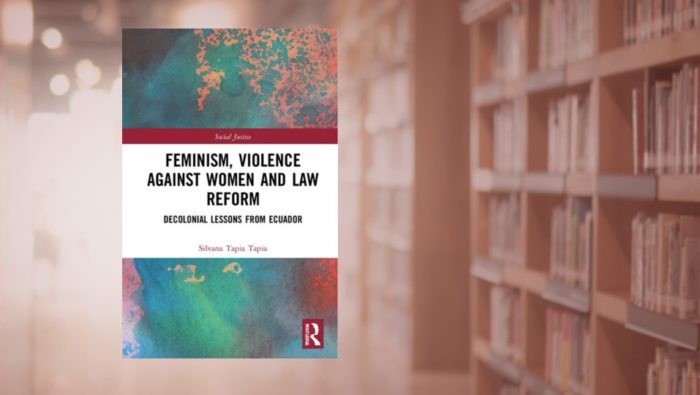
How Rights-based Penality Leads Nowhere

There is an ongoing debate in feminist Socio-Legal Studies about the role that criminal law should (or should not) play in addressing violence against women (VAW). Much of the scholarship on this issue comes from the US, but an exception is Tapia Tapia’s impressive research in Feminism, Violence Against Women, and Law Reform: Decolonial Lessons from Ecuador, on the entanglement of increased punitiveness and a Western human rights agenda in Ecuador, and how women’s organisations and feminists navigate this in relation to the state. It provides a paradigm for how to move beyond a superficial ‘for or against criminal law’ debate, with its rich material, theoretical insights and well-founded critique that goes to the heart of liberal law.
At the end of the book, Tapia Tapia concludes that ‘criminal proceedings are precarious mechanisms that open a door that leads to nowhere or takes women to a place where they do not want to be’ (p. 157). This conclusion is based on the authors’ fieldwork, which consisted of interviews with women who had filed a complaint with a specialised court, judges, case workers, and judicial officers. The chapter shows that women exposed to violence have very little to gain from filing a complaint with the court. The reasons for not pursuing a case are many – e.g. lack of financial resources, fear of further violence – but a common narrative among professionals is that women abandon the process. Tapia Tapia’s work shows that in reality women are being abandoned by the state. State resources are not being directed where they can make a difference, such as providing financial support. Instead, political commitment and resources have been channelled into criminal law.
How, then, did justice come to be perceived as equivalent to criminal law and punishment? Tapia Tapia’s answer, in short, is ‘rights-based penality’, a concept carefully developed in relation to the empirical material. Chapters 1 and 2 provide a historical background, addressing the legal regime and postcolonial landscape of Ecuador, but foregrounding women’s trade unions and indigenous women’s groups that framed a critique of the state’s law as oppressive. Prior to the 1990s, many feminists understood VAW as a problem related to poverty and social injustice, and while feminist positions were diverse, they had in common that they did not request criminalisation as a response to VAW.
Chapters 3-5 then describe the developments that led to the framing of VAW as an issue to be addressed by criminal law, by analysing official documents, material produced by women’s organisations, and interviews with feminists. By listening to feminist experiences of interaction with the state, the chapters make visible how feminist proposals are reshaped and resisted, and how colonial notions of the family prevail. Further, it is proven that the increased punitiveness has less to do with feminism than with a human rights paradigm that equates rights violations with punishment.
Chapter 4 describes the constitutional trajectory of rights-based penality and provides a thorough critique of the idea that a constitutionally restrained criminal law sympathetic to human rights is an appropriate response to rights violations. This chapter is an important reminder that the foundations of criminal law are historically contingent and part of the colonial project. It also looks at how a radical potential of indigenous justice was blocked by the privileging of human rights. In sum, we learn that ‘it is critical to interrogate liberal legality before moving onto a critique of how feminists use it specifically ‘ (p. 108). Tapia Tapia’s work inspires us to carefully examine how justifications for punishment are rationalised, showing how the implementation of human rights facilitated the subsequent privileging of criminal law.
After laying the groundwork, chapter 5 looks in more detail at the political process that led to the 2014 Penal Code and, as mentioned above, chapter 6 shows how the reform is working in practice. Both chapters illustrate the importance of examining the details of the criminal justice process and how changes to it affect women seeking justice. For example, prior to the reform, an inquisitorial model was used, which meant that the presiding judge could order protective measures when a complaint was filed. With the 2014 Penal Code, protective measures must be requested by a prosecutor, and if the complaint does not proceed, the protective order is dropped.
Beyond learning about the Ecuadorian experience, I believe that the concept of rights-based penality is a fruitful way forward in exploring the role that criminal law and procedure do or should (not) play in addressing violence against women. Tapia Tapia describes ‘rights-based penality as a colonial device through which women’s demands are continually mistranslated by a liberal legal apparatus, into demands for law reform, criminalisation and punishment’ (p. 10). It reveals two aspects of penal expansion: first, that the notion of human rights underlies many justifications of criminal justice, and second, the idea that there can be a constitutional criminal law that is supportive of human rights (p. 83).
Beyond its theoretical and methodological contribution, this book encourages us to start asking what women need to be safe, rather than asking how to fight impunity for rights violations. It is indeed a very good read.

